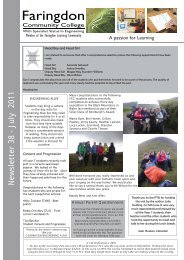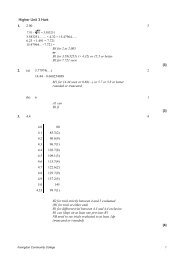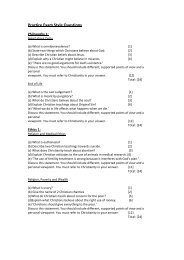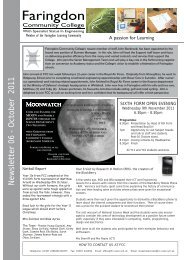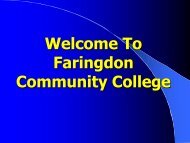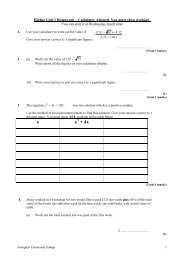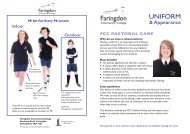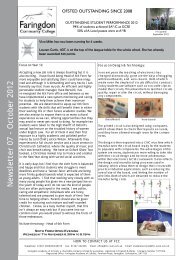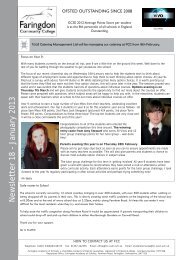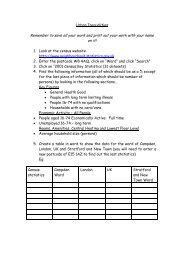You also want an ePaper? Increase the reach of your titles
YUMPU automatically turns print PDFs into web optimized ePapers that Google loves.
<strong>Chemistry</strong><br />
See sample interview questions under ‘Natural sciences’.<br />
Essential A levels <strong>Chemistry</strong> and usually maths or physics. Some courses ask for<br />
chemistry, maths and physics, while some prefer chemistry, maths and biology.<br />
Chance of being interviewed Most universities will make offers based on the content of<br />
the UCAS Apply, but a significant minority still interview.<br />
What you need to know<br />
<br />
<br />
<br />
<br />
<br />
You will probably be asked questions on what you have studied at A level.<br />
Any extra reading of scientific journals and knowledge about science issues in the<br />
news would go down well with interviewers.<br />
Try to find out about the practical applications of chemistry, such as food science or<br />
the pharmaceutical industry.<br />
Cogent is the Sector Skills Council for the chemicals and pharmaceuticals, oil and<br />
gas, petroleum and polymer industries. Visit www.cogent-ssc.org.<br />
Visit www.rsc.org.<br />
Sample interview questions<br />
<br />
<br />
<br />
<br />
<br />
<br />
<br />
<br />
<br />
<br />
<br />
<br />
<br />
Why do you want to study chemistry<br />
What is your favourite topic in chemistry Why do you like it<br />
What kind of career are you considering after finishing your chemistry degree<br />
Why is sodium chloride soluble in water and barium sulphate insoluble<br />
What do you get if you react benzene with chlorine<br />
How do you know that carbon forms a tetrahedral structure<br />
What reactions do halogenoalkanes undergo and why<br />
Draw some half-cells and discuss redox equilibria.<br />
What is special about transition metal compounds<br />
Why is copper sulphate blue<br />
How can you tell that sodium chloride is bonded ionically<br />
What is a covalent bond<br />
What is the most recent chemistry experiment you have carried out Describe it.<br />
Compare bonding in N 2 to P 4 .<br />
Compare bonding in NaCl (common salt) to diamond.<br />
What are your views on animal testing<br />
Compare Flourine’s compounds to Caesium’s compounds.<br />
Draw propanone. Show its reactions with H + /OH -<br />
Compare acid chlorides and amides.<br />
Use a phase diagram to understand how changing conditions induce state changes in<br />
water.<br />
Discuss why water’s phase diagram differs from other liquids.<br />
What are the mechanisms for nucleophilic substitution<br />
What is the measure of acid strength<br />
How many molecules are there in this glass of water
NaCl has a cubic structure with a spacing of 0.24nm between each ion. Use this to<br />
calculate an estimate for its density.<br />
Assuming that carbon is 99% 12 C and hydrogen is 99.99% 1 H, what is the probability<br />
that a molecule of C n H 2n+2 has exactly K 12 C atoms and L 1 H atoms<br />
What is entropy<br />
If you didn’t have an indicator, how can you test the pH and equivalence point of a<br />
titration<br />
What nitrogen oxides do you know Explain the structure of nitrogen monoxide and<br />
explain the significance of its unpaired electron.<br />
What is the importance of chirality in <strong>Chemistry</strong><br />
Students’ comments<br />
<br />
<br />
‘I was asked lots of A level chemistry questions, which I hadn’t expected at all.’<br />
‘Both my interviews were subject based. One was organic and the other physical and<br />
inorganic. I was asked to discuss a topic of my choice and they developed it from<br />
there. The questions asked were quite demanding because they wanted you to answer<br />
in depth. They didn’t want plain facts – they wanted you to think why things happen,<br />
apply your existing knowledge and predict reactions you hadn’t come across before.’



